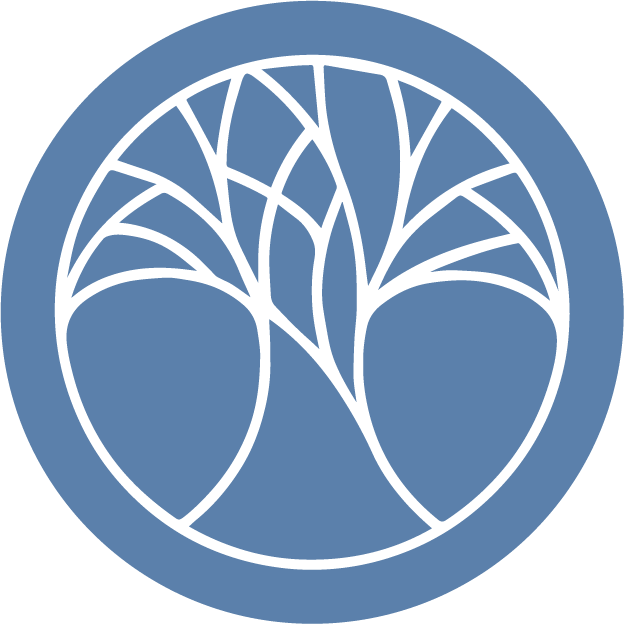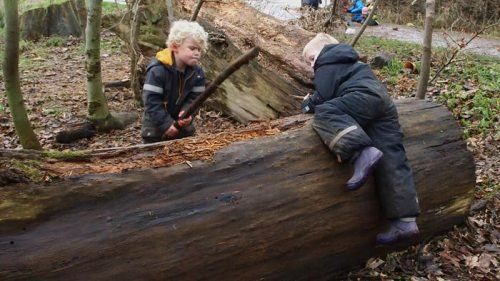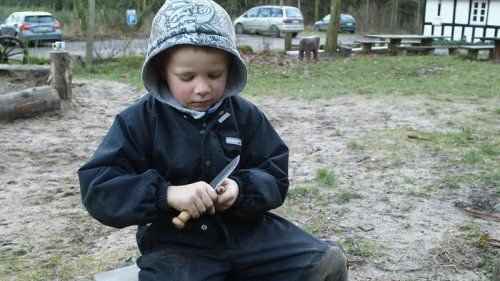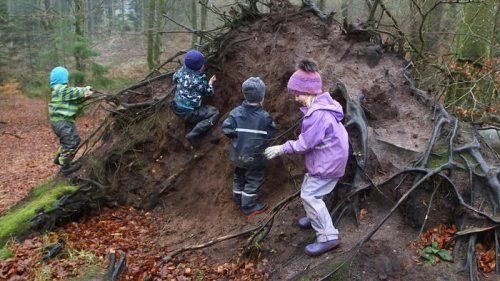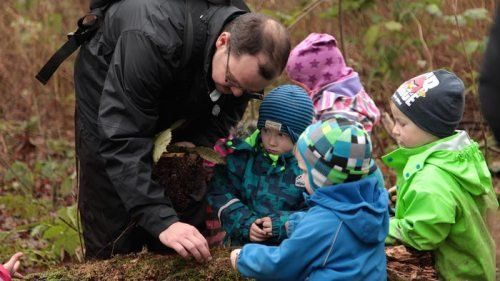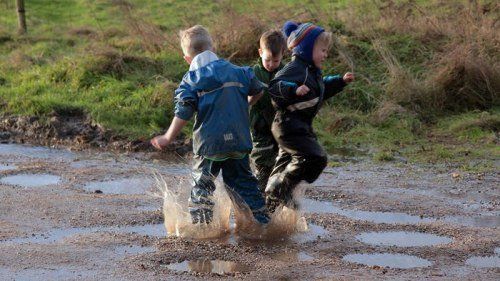….or…. you can just come to Acorn School!
It’s not about imparting specific bits of knowledge, but about nurturing people – helping them develop their natural talents and abilities.It’s something that applies from cradle-to-grave – anyone in Denmark working with young children, or the mentally ill, or the elderly, requires a university degree in pedagogy.Along with the rigorous formal training, pedagogues enjoy a status that our own childcare and aged care workers don’t seem to enjoy.But what does this mean in practice? In Johan’s case it means fostering his children’s powers of observation, their physical strength, balance and coordination, their compassion and their ability to cooperate – all with the lightest of touches.Kids Gone Wild No one would ever let Johan Laigaard run a kindergarten in Australia.
At the one he runs in Denmark, two boys swing large sticks over their heads as they whack a rotten log; another shimmies up a tall tree that bends in the breeze blowing off the nearby fjord; and others run wild in the woods.
There are no fences, and when I look around for someone to intervene, I don’t see any adults either.
There aren’t many kindergartens where this kind of behaviour would be encouraged.
If you’re the kind of parent who keeps a close eye on your kids in the playground, Denmark’s forest kindergarten will come as a rude shock – they do things differently here, as you’ll see in my story on Dateline.
Johan says he’s watching from a distance. So what happens if he thinks the children are doing something dangerous?
“I sometimes close my eyes, because I know I have to stop something, but I can also stand and watch it a little bit first because I think it’s exciting. And I can understand why they do it,” he says.
The children are taught to see knives as a tool, not a weapon.
And what do the parents think if they see their kids swaying precariously ten metres off the ground?
“They think, ‘Oh no.’ But we have taught them – the most dangerous thing you can do is shout at [the children].”
Johan’s approach to child safety sounds dangerously devil-may-care, but it’s not what it seems. Children here learn to take small risks when they’re very young and as they grow in confidence, they take bigger risks.
Johan trusts them – and their parents trust him. And given the fact that in 17 years no one’s ever been seriously injured through careless play, the trust doesn’t seem misplaced.
The children are taught when it’s safe to play by the water, but also when it’s not.
Whether he’s throwing rocks into the fjord with a bunch of enthusiastic three year-olds, or abseiling down a muddy slope with some determined five year-olds, Johan clearly gets a vicarious buzz from their juvenile thrill-seeking.
“It’s not dangerous in my opinion. And if you don’t get a little bit of danger, what’s life worth living? Everybody needs a little bit of kick sometimes.”
I suspect Johan also gets a buzz from shocking overseas visitors. When I translate the footage I shot over three days in his kindergarten in Skive, I realise that he’s actually got a very clear idea of what’s dangerous, and when he needs to lay down boundaries.
Johan warns the children about the potential dangers of uprooted trees before allowing them to play.
On one hike through the woods, Johan talks to the kids about a large tree uprooted in a recent storm, and warns them about its root ball.
“You’re never allowed to crawl under such a big pile of soil under a tree. Because all of a sudden, the tree can break,” he tells them. “And then the soil falls back. And soil is so heavy you’ll never get out of it again. So never go under a gap like this. Don’t go under it because you can be injured.”
Are forest kindergartens a good idea?Dateline’s story on Denmark’s forest kindergartens has had a huge response, but is being able to run free in the forests a good way for children to learn? Or should there be greater concern for their safety?
The following day, out foraging for Christmas decorations, Johan notices a boy waving around a long branch and gently intervenes.
“David, take care of the stick, you’ll hit our faces. You’re welcome to have it but you must look after it. Hold it up in the air so you don’t hit us. Point to the trees with it. Do you want me to break it so you only have a smaller stick and it will be easier to look after?”
“Yes,” replies David.
“I’ll help you break it. I’ll just make a stick so you can walk with it. Are you ready? That’s better. Isn’t it easier to walk with this one?”
“Sometimes they get a little accident, but that’s the way to learn,” Johan says. (Photo: Marianne Borowiec)
Johan makes it look easy, but there’s a great deal of skill involved in interactions like this – and it’s that skill, far more than the seemingly reckless play, that still impresses me several weeks later.At the heart of what makes Danish kindergartens so special is one word – pedagogy. To my ears it’s an ugly word and one I hoped my interviewees would avoid. It sounded like a very academic way of talking about the process of teaching.
But in Denmark, and in many other parts of Europe, ‘pedagogy’ is an everyday word for something that’s much more holistic than ‘teaching’.
It’s not about imparting specific bits of knowledge, but about nurturing people – helping them develop their natural talents and abilities.
It’s something that applies from cradle-to-grave – anyone in Denmark working with young children, or the mentally ill, or the elderly, requires a university degree in pedagogy.
Along with the rigorous formal training, pedagogues enjoy a status that our own childcare and aged care workers don’t seem to enjoy.
But what does this mean in practice? In Johan’s case it means fostering his children’s powers of observation, their physical strength, balance and coordination, their compassion and their ability to cooperate – all with the lightest of touches.
Jane Williams-Siegfredsen (right) with Bitten Pedersen, who runs a forest kindergarten outside of Viborg in Denmark. (Photo: Marianne Borowiec)
As Jane Williams-Siegfredsen, the author of a book on Danish forest kindergartens, puts it: “There’s this thing where the pedagogue needs to stand back sometimes and not always jump in and help the child. They need to let the child overcome problems themselves. We learn so much more from doing that.”
Comment: ‘It’s important for children to learn to be cold, wet, and survive that’Teacher Jane Williams-Siegfredsen was at first shocked and fascinated by Denmark’s forest kindergartens. Now she’s striving to give more children that freedom.
Observing Johan, he often manages to teach children a lot without ever setting out to teach them anything at all.
One boy’s spontaneous question about worms leads to a discussion about habitat, predators and prey, and eventually ends with the boy observing that mice enjoy eating pancakes. Curiosity satisfied, he’s off to jump in a puddle.
The children at the forest kindergarten have no worries about getting wet and muddy! (Photo: Marianne Borowiec)
Most impressive of all, Johan manages their behaviour without criticism or judgement and without ever raising his voice. And he does it in the forest, having fun.
“When I started to take the education as a pedagogue I didn’t really know there were such places,” he tells Amos. “But when I tried it, it was like I was a child – I could use my childhood in the work.
“And I think that is important, that you like what you are doing. The children can see if you don’t like it. Then it’s not fun for them either. So if I have fun, they have fun, so we enjoy it together.”
What a pity no one would let Johan Laigaard run a kindergarten in Australia.
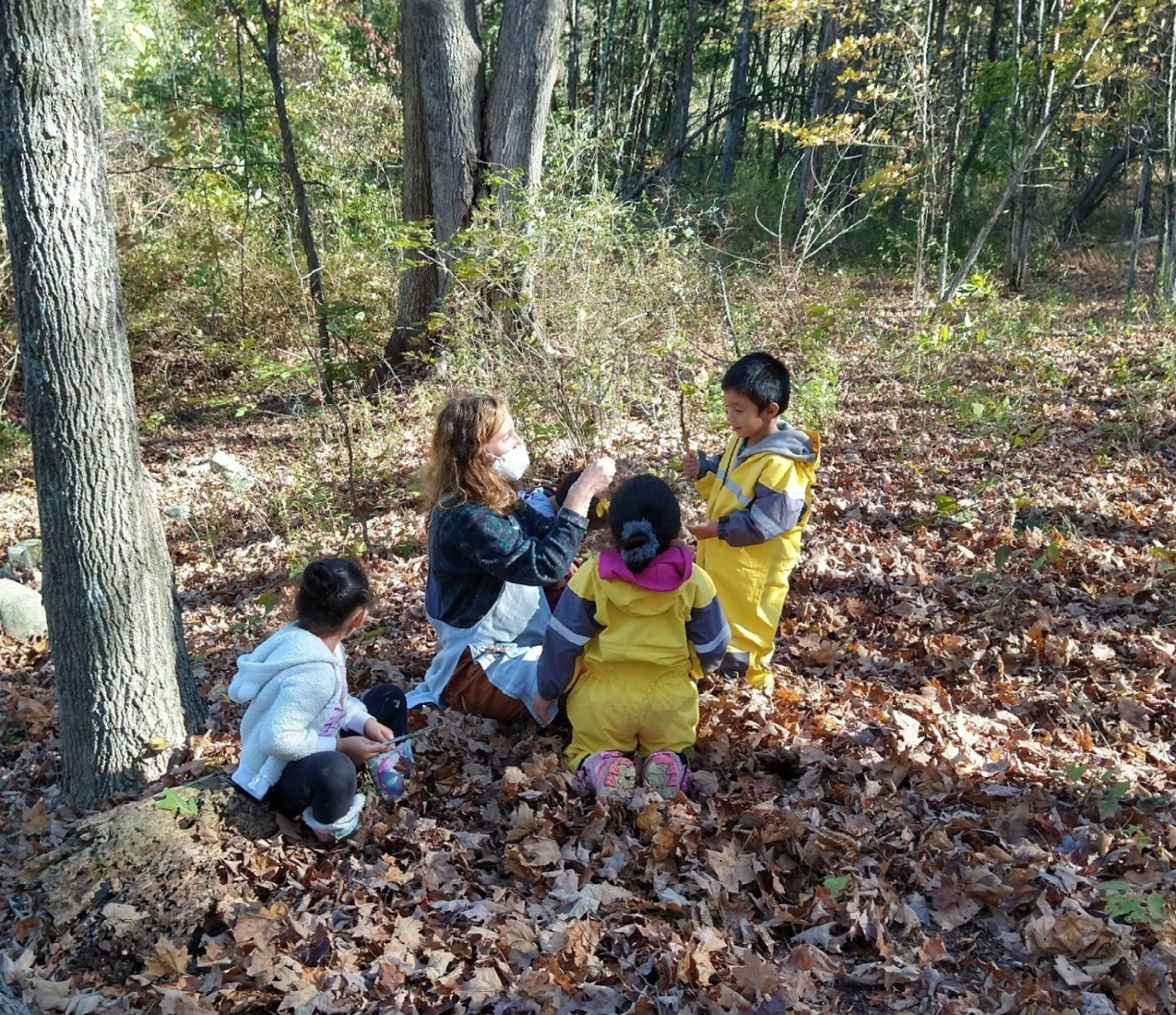
We are excited to share a new documentary about the work the Neighboring Tree Project did with a neighboring Head Start and the creation of an outdoor forest program for the children in their care. 🌿 Over the past months, Elia Gilbert , one of Acorn's kindergarten teachers, has been working with the Agri-Business Child Development Center team of educators to produce a 30 minute video which documents their collaborative process in creating an outdoor forest program for the children in their care. We hope this will inspire future Neighboring Tree Project collaborations, as well as other Waldorf educators to reach out to their neighbors in similar ways. We are now looking for more "branches" to our NT P work, as well as more Waldorf teacher people-power to work on the ground with our neighbors. After seeing the video and getting a sense of our work, please get back to us with any inspirations or feedback. We'd like to hear from our community! We hope you enjoy this film!
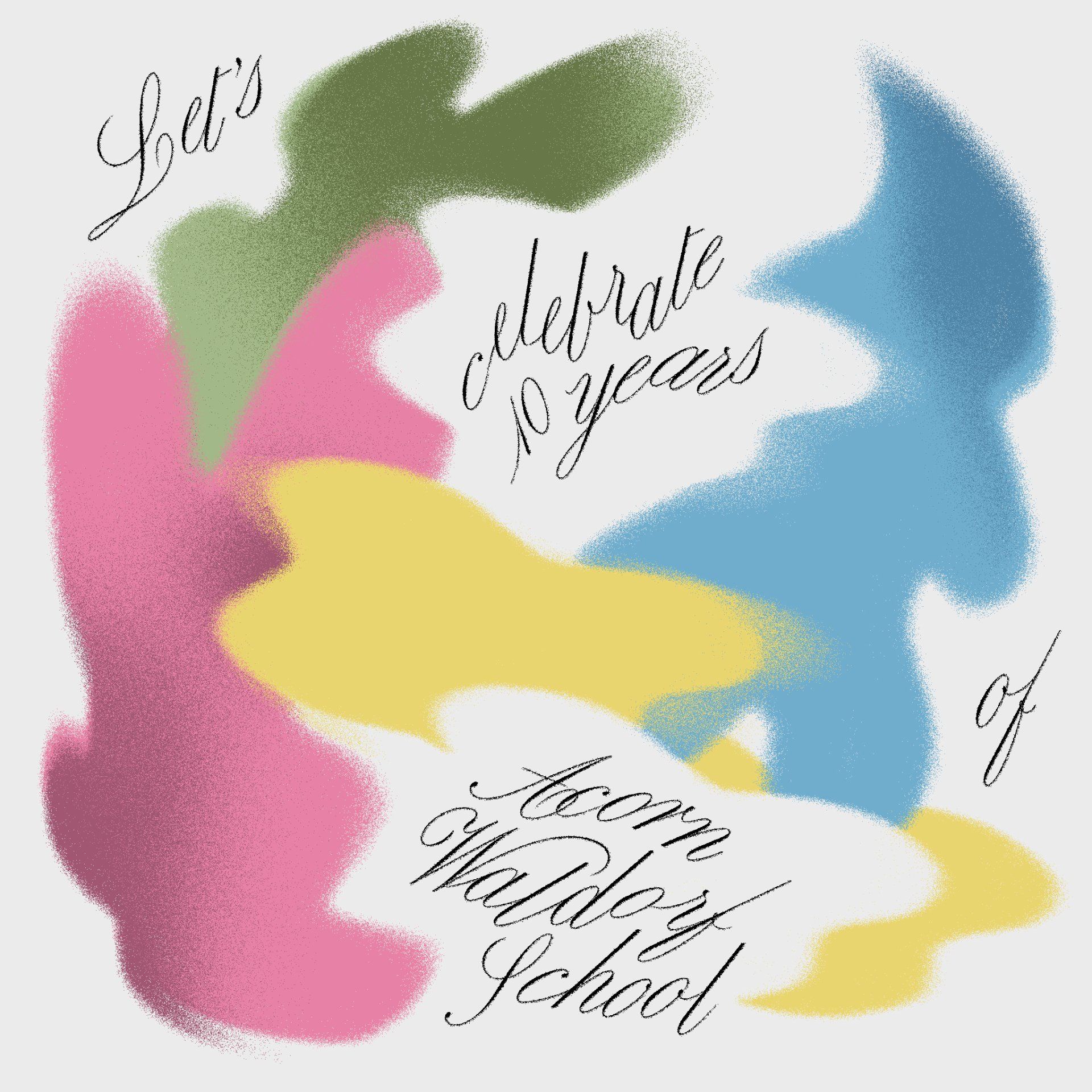
Let's Celebrate Together! Acorn Waldorf School is celebrating its 10 Year Anniversary! We began this wondrous journey with 8 intrepid families who took a chance on a tiny new program and, with their support and the support of so many families in the decade since, have grown into a vibrant center for Waldorf Early Childhood Education in the Hudson Valley. I can’t think of a better way to mark this auspicious moment in our school’s biography than making a meaningful contribution to the Sunbridge Institute Diversity Fund . During the entire month of June, for each donation to the Sunbridge Institute Diversity Fund, Acorn will give another $25. In the line where it asks, " My connection to Sunbridge is? " Please write " AWS 10 Year Anniversary ". Our hope is to inspire at least 50 individual donations but we will happily go above and beyond! If you or your family has benefitted from, enjoyed or simply appreciate what’s happening at Acorn, please consider joining me in support of this all important endeavor. This wonderful fund supports BIPOC individuals in the Sunbridge Institute Waldorf teacher education programs, creating a more diverse pool of Waldorf teacher education graduates who will be fully prepared to take on educational and leadership roles in Waldorf classrooms and schools. We are grateful and awed by Acorn’s continually star-strewn journey. May the next ten years continue to be blessed. Together we can make a difference! 🧡

The Neighboring Tree Project (NTP) is an AWS initiative that aims to create community partnerships with our "neighboring trees," i.e. local early childhood educators, schools and centers who are doing the important work of caring for children from underserved, migrant farming or inner-city backgrounds. In building these relationships, we are working collaboratively to bolster the programming offered, taking individual needs and current staff into consideration. The goal is to empower our neighbors with tools and pedagogical enrichment. We also hope to learn: we want to get to know our neighbors, the children and families in our region, and learn from whatever is brought to the group together. The forest offers nutrients to all its trees, and one tree shares with another for mutual health of the whole. Read on to learn about our first two endeavors, Agri-Business Child Development in New Paltz, NY and Meagher Pre-K in Kingston, NY.
